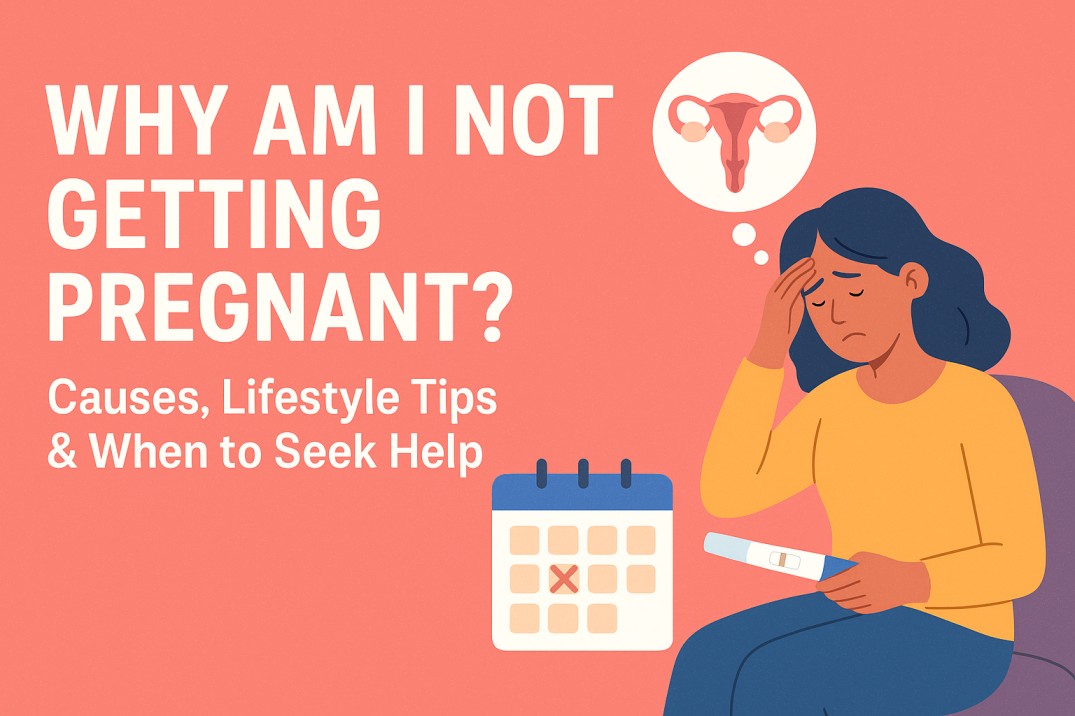
Bringing a new life into the world is one of the most beautiful dreams for many couples. But when months go by and that pregnancy test still shows a single line, it’s natural to worry and wonder — “Why am I not getting pregnant?”
If this sounds familiar, you’re not alone. Research shows that around 1 in every 6 couples faces some kind of delay or difficulty in conceiving. The reasons are often a mix of physical, emotional, and lifestyle factors — many of which are reversible.
In this detailed Dr Dad guide, we’ll explore everything you need to know about delayed conception, fertility health, and how to take the right steps toward pregnancy success in 2025.
We’ll also connect you with our related posts —
— so you can explore every stage of the fertility journey with confidence.
🩺 Understanding Delayed Conception
Doctors usually define “infertility” as the inability to conceive after 12 months of regular, unprotected intercourse. But in reality, this term often feels too clinical for couples who are simply trying and waiting. Many prefer calling it “delayed conception” — because for most, pregnancy just takes a little more time and planning.
Fertility is a shared responsibility.
It’s not just about the woman or just about the man. Both partners play an equal role in conception.
In India, rising urbanization, work stress, late marriages, and lifestyle shifts are making delayed conception more common. Studies suggest that nearly 25–30% of urban couples now experience some degree of delay in getting pregnant.
That said — a delay doesn’t always mean a problem. In fact, most couples who seek timely advice eventually conceive naturally or with minimal help.
🧬 Common Biological & Medical Causes
Pregnancy depends on the smooth functioning of several interconnected systems — hormones, eggs, sperm, uterus, and tubes. Even a small imbalance can make conception difficult. Let’s look at some key causes:
1. Female Factors
-
Ovulation Problems (like PCOS): One of the most common causes. Irregular or absent periods often mean that eggs aren’t being released consistently.
-
Age-related Decline: Fertility starts dropping gradually after age 30 and more sharply after 35. If you’re trying to conceive after 40, special planning is essential — see our guide on Having a Baby at Age 40.
-
Endometriosis: Tissue similar to the uterine lining grows outside the uterus, affecting egg quality and implantation.
-
Tubal Blockage: Past infections or surgeries can block the fallopian tubes.
-
Hormonal Imbalance: Thyroid or prolactin disorders may interfere with ovulation.
2. Male Factors
About 30–40% of infertility cases are due to male-related causes.
-
Low sperm count or motility
-
Hormonal issues
-
Varicocele (vein swelling near the testes)
-
Smoking, alcohol, or excessive heat exposure (like saunas, tight jeans)
-
Chronic stress and lack of sleep
3. Combined or Unexplained Factors
In some couples, all tests appear normal, yet pregnancy doesn’t happen. This is called unexplained infertility, often linked to subtle lifestyle or immune factors.
🌿 Lifestyle & Environmental Factors (The Hidden Fertility Killers)
Modern life may look glamorous, but it quietly strains fertility for both men and women. Here are key lifestyle causes of delayed conception in 2025:
1. Stress & Overwork
Chronic stress can disrupt hormones like cortisol and prolactin, directly affecting ovulation and sperm quality. Meditation, deep breathing, and balanced schedules are small but powerful solutions.
2. Unhealthy Diet & Obesity
Processed foods, sugary drinks, and fast-food habits lead to insulin resistance and PCOS. Aim for a balanced Indian diet rich in green vegetables, millets, pulses, and healthy fats.
3. Environmental Pollution
Studies have linked air pollution to lower fertility rates and even higher risks of pregnancy complications. Couples in metro cities like Delhi should focus on antioxidant-rich diets (berries, citrus fruits, nuts) and consider indoor air purifiers.
4. Smoking & Alcohol
Both harm fertility. Smoking damages egg DNA and reduces sperm motility; alcohol alters hormones. Even “social drinking” can delay conception.
5. Excessive Caffeine
More than 2–3 cups of coffee daily may interfere with hormone levels. Switch to herbal teas or coconut water.
6. Lack of Physical Activity
Moderate exercise 4–5 times a week improves circulation and hormone balance. Yoga, walking, and fertility-friendly workouts like Surya Namaskar can make a big difference.
7. Irregular Sleep Patterns
Sleep regulates hormones like leptin and melatonin. Irregular bedtime affects fertility and mood — try sleeping before 11 p.m.
🧠 Emotional Factors: The Stress–Fertility Cycle
Emotional well-being plays a bigger role than most realize. Anxiety and fear create a loop where stress hormones interfere with reproductive hormones — delaying ovulation and sperm production.
That’s why it’s crucial to handle emotional stress consciously. Our article Top Pregnancy Fears: When to Worry and When to Let Go explains how fear itself can become a barrier.
-
Talk openly with your partner.
-
Take breaks from “trying” every now and then.
-
Avoid comparisons — everyone’s journey is unique.
-
Engage in hobbies, nature walks, or mindfulness exercises.
A calm mind often leads to a fertile body.
🧪 When Should You Get Tested?
If you’ve been trying to conceive for:
… it’s time to consult a fertility specialist.
You should also seek help earlier if you have:
-
Irregular or absent periods
-
Previous miscarriages
-
Known medical conditions (thyroid, PCOS, diabetes)
-
Pelvic infections or surgery
-
Very painful periods or intercourse
Common Tests Include:
-
Hormone Profile: FSH, LH, prolactin, thyroid, AMH levels
-
Ovulation Tracking: Ultrasound and basal temperature charts
-
Semen Analysis: For sperm count, motility, morphology
-
Ultrasound Pelvis or HSG: To check uterus and fallopian tubes
-
Lifestyle Evaluation: BMI, diet, stress levels, sleep quality
These tests help identify the root cause and guide treatment options — from simple medication to advanced techniques like IUI or IVF if required.
🩹 Medical & Lifestyle Treatments
Modern fertility care is more effective than ever, and many couples conceive naturally with just small lifestyle and medical adjustments.
1. Lifestyle Modifications
-
Maintain healthy BMI (18.5–24.9)
-
Exercise regularly
-
Eat fertility-boosting foods: flaxseeds, walnuts, spinach, citrus, whole grains
-
Avoid smoking/alcohol
-
Manage work stress with short breaks and vacations
2. Medical Treatments
-
Ovulation Induction: Simple tablets or injections to trigger egg release.
-
Hormonal Balancing: Treating thyroid or prolactin issues.
-
Surgery: For fibroids, endometriosis, or blocked tubes.
-
IUI or IVF: For couples where other options don’t work — but should be chosen after thorough evaluation.
Remember — success rates depend on age, health, and commitment to healthy living.
🧘♀️ Emotional & Social Support for Couples
Delayed conception can bring silent emotional pain — sadness, self-blame, or family pressure. In Indian society, this pressure can be intense, especially for women. But it’s vital to remember: fertility is a shared journey, not a solo burden.
Tips for Emotional Balance:
-
Stay united: Discuss openly with your partner.
-
Limit online comparisons: Every couple’s story is different.
-
Seek counselling: Fertility counsellors can help navigate stress.
-
Celebrate small wins: Every step forward — a regular cycle, a positive test result, an improved report — matters.
-
Practice gratitude: Focus on overall wellness, not just conception.
For emotional health resources, visit our Top Pregnancy Fears guide.
🧾 Pre-Pregnancy Checklist: Your Fertility Roadmap
Before you begin or while trying to conceive, use this Dr Dad Pre-Pregnancy Checklist:
| Step | What to Do | Why It Matters |
|---|---|---|
| 1 | Schedule health check-up | Detect hormonal or nutritional issues early |
| 2 | Track ovulation | Know fertile days accurately |
| 3 | Quit smoking/alcohol | Improve egg and sperm quality |
| 4 | Manage weight | Balance hormones, increase conception chances |
| 5 | Take folic acid | Prepares for healthy baby’s neural development |
| 6 | Exercise regularly | Boosts circulation and mood |
| 7 | Reduce caffeine | Supports hormonal balance |
| 8 | Sleep 7–8 hours | Restores natural fertility rhythm |
| 9 | Manage stress | Prevents cortisol interference |
| 10 | Stay positive | Mind–body link improves fertility |
🕰️ When to Seek Professional Help
If natural methods and lifestyle changes haven’t worked after a year (or six months for women > 35), consult a fertility expert.
Doctors can help you:
-
Identify the exact reason for delay
-
Choose evidence-based treatment
-
Track ovulation scientifically
-
Support emotional well-being through counselling
Remember — getting medical help doesn’t mean losing hope. It means taking control of your journey.
💬 FAQs: Common Questions About Delayed Conception
Q1. How long should we try before seeing a doctor?
➡️ Under 35 years: 12 months of regular unprotected sex.
➡️ Over 35 years: 6 months.
Q2. Can stress alone stop pregnancy?
Yes, prolonged stress can alter hormone balance and ovulation. Relaxation and lifestyle adjustments help immensely.
Q3. Does being overweight reduce fertility?
Absolutely. Even a 5–10% weight loss can restore ovulation and improve chances of conception.
Q4. Is age 40 too late to have a baby?
Not necessarily — but fertility declines sharply after 40. See our detailed guide Having a Baby at Age 40 and After 40 for practical insights.
Q5. How can men improve fertility?
Healthy diet, regular exercise, no smoking, adequate sleep, and stress control all help boost sperm health.
🌈 The Dr Dad Message: Hope, Patience & Science
Parenthood isn’t a race — it’s a journey of patience, understanding, and love. Whether you conceive naturally or with assistance, your path is valid and beautiful.
At Dr Dad, we believe knowledge empowers families. With awareness, emotional support, and medical guidance, conception delays can be overcome safely.
So take a deep breath. Keep your body healthy, your mind peaceful, and your hopes alive. The line on your test may turn positive when you least expect it. 🌼
Reference : Healthline.
Disclaimer: This content was automatically imported from a third-party source via RSS feed. The original source is: https://drdad.in/why-am-i-not-getting-pregnant-causes-lifestyle-tips-when-to-seek-help/. xn--babytilbehr-pgb.com does not claim ownership of this content. All rights remain with the original publisher.






